Disperse the Gloomy Clouds of Night
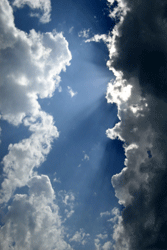 Some people in prison are given a prison name. It’s sort of like a “street” name. It’s a sign of acceptance or, sometimes, of infamy. The origins of some prison names are mysterious, even for their owners. Others are imposed, but not welcomed."Guns," for example, is a twenty-two year old African-American. He's a tough kid, and one of my friends. He comes by my cell every day. I asked him why he's called "Guns." He said he isn't proud of it, but he told me about his past. It's strange hearing a twenty-two year old speak of having “a past." He asked me not to call him "Guns," anymore. If I call him Joseph, he said, it might catch on.Sometimes prisoners brag about their crimes, but Joseph spoke of his past in furtive tones, with occasional glances to see if I looked horrified. He spoke with a mixture of honesty and shame, as though he found it painful that I should know these things about him. “I was just a kid then, on the streets,” he pleaded. “I’m different now.”I think it's a good sign that Joseph feels shame for his crime and that he hopes for a future different from his past. His remorse speaks well of him. He ended by asking if I'm still his friend after knowing these things. “Yes,” I said. "That's part of your penance." Joseph laughed.Some of my other friends here also have prison names. There's "Biggie," "Butch," “Chico, "Chino," "Digs," "Pookey," "Ponch," and "Stax.” Then there are names like "Mikey Goggles, "Joey Donuts," and "Joey Two-Plates," the origins of which are rooted in stories long forgotten.I am called "G." Simply "G." It's odd that I was called "G" by my sister, brothers and friends as a kid. Some prisoners began calling me that a few years ago, but I don't know why or who started it.I guess I can live with "G." I've been called a lot worse, but not by prisoners. Someone identified with Voice of the Faithful recently called me some horrible names in a comment he tried to post on These Stone Walls. Instead it was printed and mailed to me. I'm glad you weren't subjected to it. The "faithful" Catholic who wrote it has never met me. Voice of the Faithful had a recent convention promising to clean up its act. We can only hope.Anyway, I'm glad Joseph wants to be rid of "Guns." It's a good sign that he's reflecting on who and what he wants to be known for. Names mean a great deal, and so does affiliation. Joseph recently said - with some wisdom beyond his years - "If I'm known by the company I keep, I just thought I should keep better company." I didn't catch on right away that I was part of the effort to rehabilitate his image.
Some people in prison are given a prison name. It’s sort of like a “street” name. It’s a sign of acceptance or, sometimes, of infamy. The origins of some prison names are mysterious, even for their owners. Others are imposed, but not welcomed."Guns," for example, is a twenty-two year old African-American. He's a tough kid, and one of my friends. He comes by my cell every day. I asked him why he's called "Guns." He said he isn't proud of it, but he told me about his past. It's strange hearing a twenty-two year old speak of having “a past." He asked me not to call him "Guns," anymore. If I call him Joseph, he said, it might catch on.Sometimes prisoners brag about their crimes, but Joseph spoke of his past in furtive tones, with occasional glances to see if I looked horrified. He spoke with a mixture of honesty and shame, as though he found it painful that I should know these things about him. “I was just a kid then, on the streets,” he pleaded. “I’m different now.”I think it's a good sign that Joseph feels shame for his crime and that he hopes for a future different from his past. His remorse speaks well of him. He ended by asking if I'm still his friend after knowing these things. “Yes,” I said. "That's part of your penance." Joseph laughed.Some of my other friends here also have prison names. There's "Biggie," "Butch," “Chico, "Chino," "Digs," "Pookey," "Ponch," and "Stax.” Then there are names like "Mikey Goggles, "Joey Donuts," and "Joey Two-Plates," the origins of which are rooted in stories long forgotten.I am called "G." Simply "G." It's odd that I was called "G" by my sister, brothers and friends as a kid. Some prisoners began calling me that a few years ago, but I don't know why or who started it.I guess I can live with "G." I've been called a lot worse, but not by prisoners. Someone identified with Voice of the Faithful recently called me some horrible names in a comment he tried to post on These Stone Walls. Instead it was printed and mailed to me. I'm glad you weren't subjected to it. The "faithful" Catholic who wrote it has never met me. Voice of the Faithful had a recent convention promising to clean up its act. We can only hope.Anyway, I'm glad Joseph wants to be rid of "Guns." It's a good sign that he's reflecting on who and what he wants to be known for. Names mean a great deal, and so does affiliation. Joseph recently said - with some wisdom beyond his years - "If I'm known by the company I keep, I just thought I should keep better company." I didn't catch on right away that I was part of the effort to rehabilitate his image.
The most difficult step toward progress for some prisoners is to be "their own man" without being influenced by what their peers expect of them. Sometimes setting aside a street name is a sign of inner change. When Saul changed, he became Paul.
BEWARE THE NOONDAY DEVIL
This is a difficult time of year for most prisoners. There are two contagious diseases that spread through this prison every year as winter approaches, reaching epidemic status by Christmas. You've all had them both. The first is any variation of the common cold. I just had one that lasted twelve days. It swept through here like a wildfire as every bug does. We're all bracing for the predicted outbreak of HINI flu. It seems a matter of time.
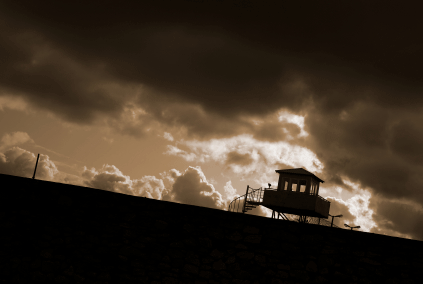
The other disease - the more insidious one - is depression. Any celebration of family is like a vortex that sucks the spirit out of prisoners. The first signs of an epidemic come with the end of Daylight Saving Time. Simply put, darkness lends itself to despair.It's worse this year for lots of reasons: the economy suffers and so do prisoners' families - those who have families anyway. It's also far more crowded in here than it was a year ago. For the first time since I have been here, there are now prisoners living in the recreation areas outside our cells. It's awful for them. The lights are on 24/7, and every sound echoes off the high concrete walls.The field (see "Field of Dreams") - the sole place to walk outside - was closed two months ago and will not open again until late in May. Everyone here has a sense of feeling squeezed, like animals in a forest whose habitat is being shrunk by an ever encroaching urban sprawl.In his article about my friend, Pornchai, ("Pornchai's Path to the Narrow Gate"), author Ryan MacDonald pointed out that "the United States has 5% of the world's population and 25% of the world's prisoners." Here's a far more startling statistic: Between 1980 and 2005, the New Hampshire state population rose 34% while its prison population rose nearly 600% with no commensurate increase in crime.These statistics are reflected right here. The only place to go outside of our cells is “the pod,” and now twelve additional prisoners live out there. There’s a set of bunks just four inches from my cell door. The pod also contains nine tables with chairs and benches for writing or card games, two large work-out stations, three stationary exercise bikes, three telephones for pre-paid or collect calls (only two of them work), a really noisy "fooz ball" table, a ping pong table, a pool table, and now - as of a month or so ago - twelve bunks with men living in them, with more expected.It's sort of like a giant hamster cage with everyone frantically trying to expend pent up energy and dispel stress according to varying rhythms and schedules.For the guys living in the overcrowded recreation areas, it's a bit like living in a city bus terminal. To the credit of other prisoners, most try to be quiet at night and early in the morning, and some did all they could to help new arrivals make the best of the situation they must live in.Sixty men cannot live in such an environment without disputes. They arise daily, some bigger than others, and often they linger only to arise again another day. I am usually oblivious to the drama that goes on outside my cell door, and it has to be that way. It's what’s expected of me. In a real sense, the old model of priesthood is imposed on me by other prisoners: in the world, but not of it. There was something to be said for that model. When the people around me become polarized, life here takes a decidedly downward turn. Sometimes I’m thrust into being an instrument of peace. It is not very effective if I am polarized as well.
STRANGERS AND ALIENS
Often, prisoners’ worst disputes are with themselves. As I'm typing this in my cell, Joseph (formerly, "Guns") came by and asked, "You busy, G?" It's a question I hear all day long. As Christmas approaches, the mood in the prison spirals further down a dismal path as introspection and personal inventories commence. I can understand why the suicide rate goes up at Christmas. The disenfranchised feel their alienation so much more vividly at times of family celebration. It's alarming to hear of the number of young men in prison with no families.Some just burned every bridge they ever had, and now have to live with the wreckage. Many others simply never had any bridges at all. The introspection of prisoners, especially near Christmas, takes one of two directions. Some resolve to rise up out of their past and leave it behind. Others just give up all hope, and hand themselves over to despair. I spend time every day with men on both paths.
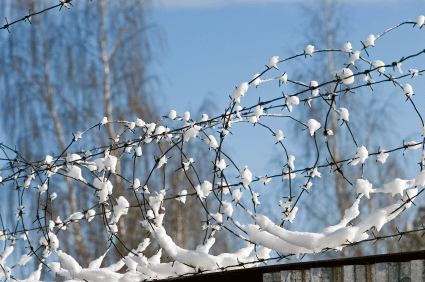
Some prisoners have very little outside of here. Last year on Christmas day, I just had to get outside. It was cold, and it had snowed, but I went to the small, caged-in yard in front of this building anyway. A guard closed the gate behind me, locking me in the snow-covered yard for an hour. The only other person there was a young man I did not know. He sat on a frozen wooden bench staring at his shoes.It was a sad sight on Christmas Day. I walked over and sat next to him. "JJ" was hostile and angry, but under that - it's almost always so - was a world of hurt. In an hour on Christmas afternoon I learned that JJ was twenty-two years old, had grown up in Boston in seventeen foster homes, had ADHD, and is now in prison for the first time because it's where his incredibly poor judgment took him. Before prison, JJ was homeless, drifting from shelter to shelter.On this Christmas Day, he came face to face with the empty wreckage of his life. He was outside in the cold alone because he had to get away from the seven other prisoners in whose cell he had landed just the day before. JJ had not had a single contact beyond these prison walls.JJ had little sense of his African-American identity and heritage. All his energy went into mere survival. We became friends, but the others I know here could barely tolerate JJ. He had a way of alienating everyone but me. After a year or so, JJ was moved to another prison. Prisoners cannot write to each other, so I do not know how JJ is. There is no happy ending here. I'm told he's living with 100 other prisoners in a prison gym converted into a huge dorm. It can't be a nice way to spend Christmas, but I doubt very much that JJ has ever had a Christmas to compare it with.
WORKING OUT A SURVIVAL PLAN
Fighting off depression in such a place is a challenge. The atmosphere is often not very conducive to prayer and reflection. A friend once wrote to me asking if I could meditate daily in here. Not hardly! What helps fend off depression more than anything, I find, is daily, rigorous exercise. That's a challenge, too, because we're trapped inside so much more in the winter months.
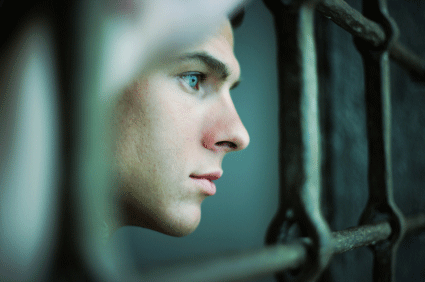
For the last ten years, in sickness and in health, I spend ninety minutes a day in intense exercise. From 5:30 to 7:00 PM six days a week, I work out. I take Sunday off. Yesterday's workout consisted of 300 sit-ups, an hour with weights, and then 100 turns with an abdominal wheel. I am joined in this by Pornchai, Koji, and Scott (they all had recipes in "Guess What's Coming to Dinner"), and more recently by Joseph, Ben, and Mikey Goggles.I have to do this every day no matter what comes. I must! If I don't, I fear I will drift into the pattern of those who sleep all day and ruminate all night. Instead of "doing time," time does them. It's then just a matter of time before depression takes over and a sense of futility sinks in. It’s a challenge to teach discipline to people who have none. It’s first done by example.Living a disciplined life is the only way to survive prison. I rise out of my bunk seven days a week at 7:00 AM. I do not lay down on my bunk again until 11:30 PM (midnight on Sundays, after Mass!), It is at least ten years since I have taken a nap or slept beyond 7:00 AM, even when sick.Two years ago, I developed some tendonitis and took a week off from working out. The week stretched into a month, and then three months. It's so hard to get back into a strenuous routine. My friend, Pornchai, started to nag me. "If you don't do it, you'll die!" he warned. He was right, and it would be slow and miserable. Pornchai has bi-polar disorder, and manages it with strenuous exercise every day. He puts in ninety minutes each morning and two hours each night. I am grateful to him that he pushed, nagged, and cajoled until I was back on track with him.Last night, a twenty-six year old walked past while I stood in line to return a pair of 50-pound dumb-bells. "You really stick with this for an older guy," he said. I'm not sure I should feel flattered by that, but I took it well. I told him why I stick with it - that the alternative is to give in, and then eventually give up. This morning, he was in our cell asking Pornchai to help him devise a work-out plan.
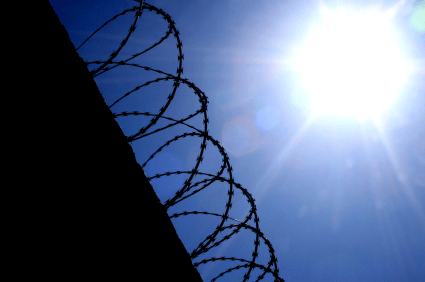
O come, 0 come, Emmanuel,And ransom captive Israel,That mourns in lonely exile here,Until the Son of God appear.
O come, thou Dayspring from on high,And cheer us by thy drawing nigh;Disperse the gloomy clouds of nightAnd death's dark shadow put to flight.
(Veni Emmanuel,” 9th Century Chant, Verses One and Six)
